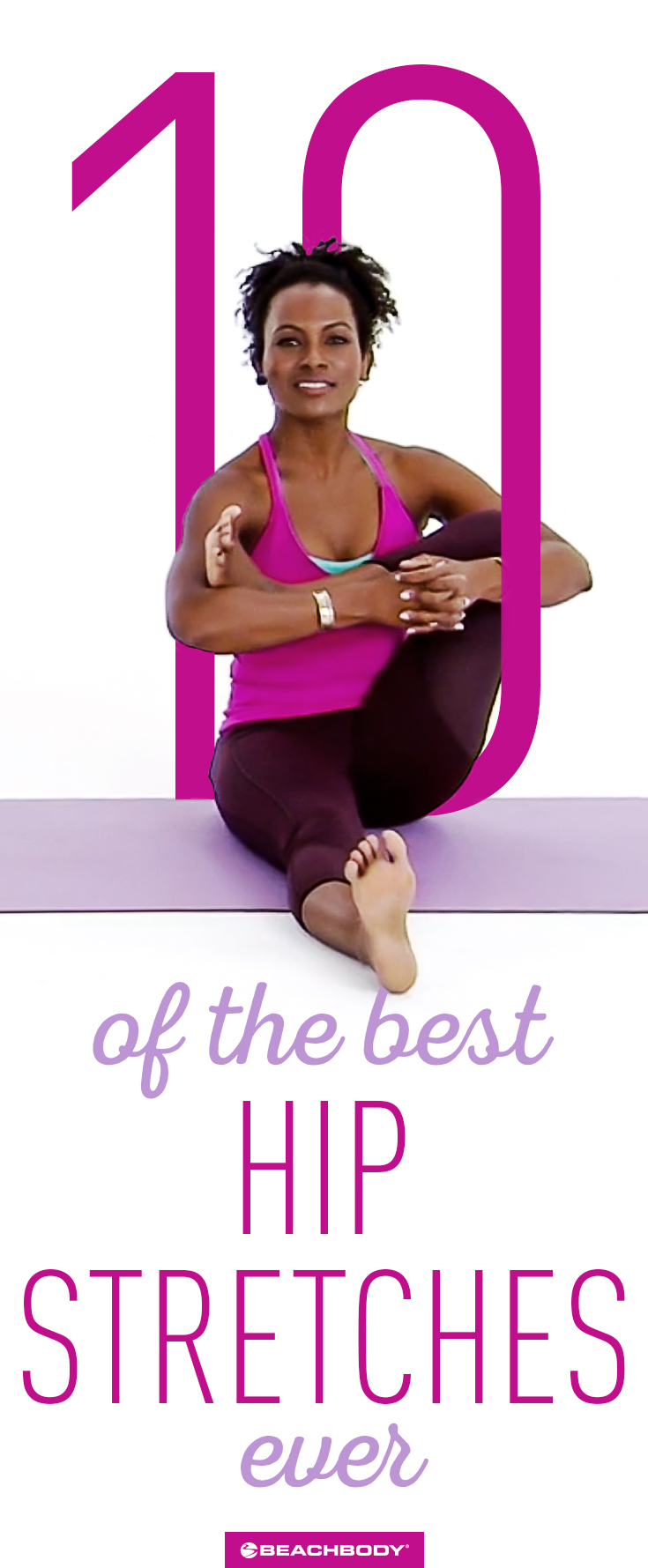10 of the Best Hip Stretches Ever
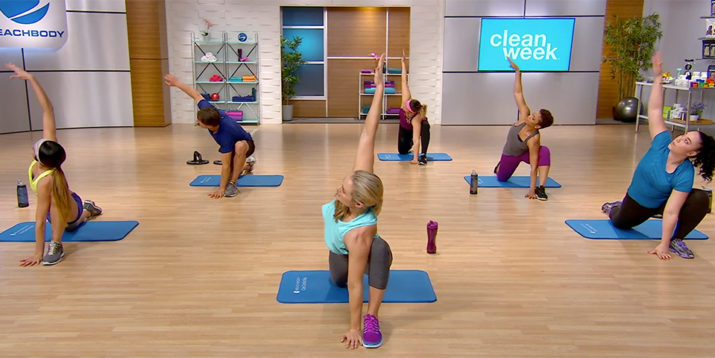
Life in the 21st century has given us many things: cheap communication… electric cars… personalized entertainment…
And tight hips.
Consider: All of the time you spend online (over 10 hours a day, by some estimates) — whether you’re drafting spreadsheets, posting on Instagram, or watching TikTok videos — is also spent in a chair.
That’s a lot of time for your hip joints to be stuck in a single position.
That’s a problem.
“Elongated periods of sitting sends messages to certain muscles to stay turned on, which keeps other muscles turned off,” says Cody Braun, personal trainer and NASM performance enhancement specialist. “This creates an imbalance, which can immobilize your hips.”
Your hips are built to move in almost any direction, explains Braun, and when they’re stiff, they don’t just make exercise more difficult; they also make you more prone to pain in surrounding joints — including the oft-troublesome lower back.
If, like most of us, your hip joints could use some TLC, help has arrived.
All you need to do is spend a moment or two before and after your workouts — or, heck, while watching TV — on a time-honored fitness activity few of us do enough of: stretching.
Below, we’ll show you some of the best hip stretches to improve flexibility and mobility, hopefully making up for all that time on the couch.
10 of the Best Pre- and Post-Workout Hip Stretches
Together with a healthy diet and a great workout program, the following hip stretches will leave you feeling and looking your best.
Seated Leg Cradle
Type of stretch: Static
Benefits: Lengthens and relieves tension in the glutes, adductors, and hamstrings.
Appears in: Yoga Studio – Hip Opening Flow with Faith
• Sit on the floor with both legs extended straight in front of you, feet flexed.
• Keeping your back straight, draw your left knee toward your chest, and try one or more of the following variations:
- Holding your left knee in your left hand, grab your left ankle with your right hand and draw it toward your chest as far as you can.
- Draw your left ankle toward your chest and rest your lower leg inside the creases of your elbows, bending them to draw your leg as close as you can to your chest.
- Draw your left ankle toward your chest and wrap your arms around the lower leg, interlacing your fingers with your knee inside the crease of your left elbow and your foot inside the crook of your right. Hug your lower leg toward your chest as far as you can.
• Keeping your back flat, your chest up, and both feet flexed, rock slightly left and right.
• Hold for 30 seconds, then repeat on the other side.
Standing Butterfly Lift
Type of stretch: Dynamic
Benefits: Activates the glutes while improving mobility in the hip capsule (the ligament that attaches the leg to the pelvis) and adductors.
Appears in: Yoga Studio – Get Well-Rounded with Elise
- Stand with your feet shoulder-width apart about 18 inches behind two yoga blocks positioned on the floor at the tallest height.
- Hinge forward at your hips and place your hands on the blocks. (If that’s too difficult, use a taller surface like a chair instead.)
- Bend your right knee, pulling your heel toward your right glute, and keep it there throughout the set. This is your starting position.
- Keeping your back flat and standing leg straight, lift your right knee as far out to your right side as you can.
- Reverse the move, lowering your right knee until it’s close to your left.
- Repeat for 10–12 controlled repetitions, then repeat on your other side.
Frog Alternate Legs
Type of stretch: Dynamic
Benefits: Stretches the adductors and improves mobility in the hip capsule.
Appears in: SHIFT SHOP – Shift Mobility
- Lie facedown, bend your knees about 90 degrees, and spread them as wide as you can. Fold your hands under your forehead to relax your upper body.
- Keeping your knees bent, slowly roll your right thigh inward, lowering your right foot toward the floor.
- Try to tap your right foot on the floor, and reverse the move, repeating on your other side.
- Continue slowly alternating sides for 30 seconds.
Batakatasana
Type of stretch: Static
Benefits: Lengthens the adductors and reduces tension along the entire spine and back of the neck.
Appears in: 21 Day Fix – Yoga Fix
- Sit on the floor upright with your legs bent, the soles of your feet together, and your knees spread wide.
- Keeping your knees spread as wide as possible, take hold of your feet and slowly pull your forehead toward the floor.
- Hold this stretched position for 30–60 seconds.
Scorpion
Type of stretch: Dynamic
Benefits: Stretches the quads and hip flexors, and activates the glutes.
Appears in: P90X3 – Dynamix
- Lie on your stomach, with your legs straight and arms extended out to the sides, forming a “T.” Your palms should face down.
- Keeping your right leg straight, lift your left leg off the floor, bend your left knee, and cross your left foot behind your right, continuing up toward your right hand.
- Try to tap your right hand with your left foot, and return to the starting position.
- Continue for 30 seconds, and repeat on your other side.
Runner’s Lunge
Type of stretch: Static or dynamic, depending on how long you hold the position
Benefits: Stretches the adductors and glutes.
Appears in: 21 Day Fix EXTREME – Yoga Fix Extreme
- Assume a push-up position: hands and balls of your feet on the floor, both shoulder-width apart, and your body straight from head to heels.
- Step your right foot to a point just outside your right hand. (Your right knee should be near your right shoulder.) If possible, lower your elbows to the floor.
- Hold for 15 seconds, and reverse the move to return to the starting position
- Repeat the entire sequence on your other side.
Sumo Reach
Type of stretch: Dynamic/static
Benefits: Strengthens the glutes and shoulders, stretches the adductors, opens the hip joints and rib cage.
Appears in: INSANITY – Max Recovery
- Assume a wide stance, turning both feet out about 45 degrees.
- Keeping your torso upright, and your core engaged, bend your knees and lower your trunk as you extend both arms straight out to the sides, palms down, forming a “T.”
- Perform three pulses downward, sinking more deeply into this wide-stance (“sumo”) squat each time.
- Keeping your back long and your arms straight, bend your torso to the left as far as you can, and try to place your left palm on the floor near the inside of your left foot.
- Look up at your right palm and hold the position for a 5- to 10-count.
- Brace your core to return to the starting position, and perform the entire sequence on your other side.
Inner Thigh Stretch
Type of stretch: Static
Benefits: Lengthens the adductors and hamstrings.
Appears in: TurboFire – Stretch 40
- Sit on the floor with your left leg straight, your right knee bent and your right foot flat on the floor.
- Loop a strap around the arch of your left foot, and lie back as you raise your left leg straight overhead. This is your starting position.
- Lower your right knee outward toward the floor as far as you can, as if performing a half-butterfly stretch.
- Holding the ends of the strap in your left hand, pull it back until you feel a deep stretch in the back of your left thigh and, keeping your left leg straight, slowly lower it out to the left as far as possible.
- Place your right hand on the inside of your right knee and gently press it downward toward the floor, holding for 30 seconds.
- Slowly bring your left leg and right knee back to the starting position, and repeat the entire sequence on your other side.
Groiner
Type of stretch: Dynamic
Benefits: Stretches the glutes, adductors, and hip flexors.
Appears in: P90X3 – Dynamix
- Assume a push-up position: hands and balls of your feet on the floor, both shoulder-width apart, and your body straight from head to heels.
- Step your left foot to a point just outside your left hand.
- Sink into the move for a 1-count, lowering your hips as far as possible.
- Return your foot to the starting position.
- Continue for 30 seconds, then repeat on the other side.
Too tough? Perform the move with your hands elevated on yoga blocks.
World’s Greatest Stretch
Type of stretch: Static
Benefits: Lengthens the hip flexors, adductors, chest, and rib cage.
Appears in: Clean Week – Active Flex
- Start in a deep lunge with your right foot forward, your left knee and top of your left foot on the floor behind you, and your palms about hip-distance apart on the floor inside your right foot.
- Keeping your back flat and both arms straight, lift your right hand up toward the ceiling as high as you can, twisting your torso into your right knee.
- Hold for 10 seconds, then return your right hand to the floor.
- Maintaining the same position in your lower body, lift your left arm up toward the ceiling in the same manner.
- Hold for 10 seconds, then slowly return your left hand to the floor.
- Switch sides, and repeat the sequence.
Why Hip Mobility Is Important
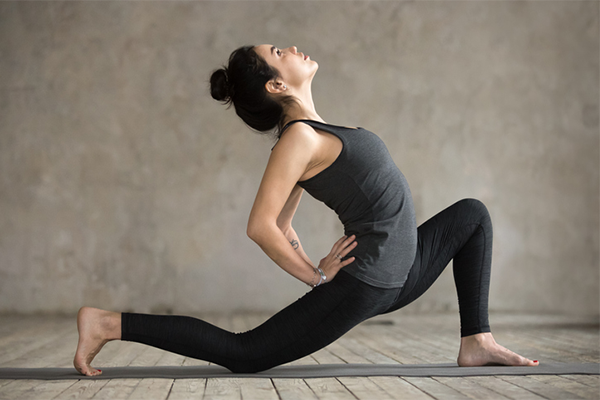
Quick physiology lesson: When a joint becomes stiff and immobile, the joints above and below it move to compensate. So if you can’t move your hips, you’ll move your lower back instead.
Know anyone with lower back pain?
Oh, that’s right — the overwhelming majority of Americans have lower back pain.
If that includes you, you may benefit from making some or all of the hip stretches below part of your regular routine.
But mobile hip joints don’t just relieve pain.
They’re also essential for walking, hiking, running, jumping, dancing, playing sports, and pursuing virtually any fitness goal safely and effectively.
Want to develop stronger, more muscular legs? Hip mobility allows you to lunge and squat more deeply so you can reach your muscles’ potential.
Want to avoid injury? Hip mobility improves range of motion so you can perform exercises more safely.
Anatomy of the Hips
The pelvis, that sturdy, bony structure that houses your hip joints, is the Grand Central Station of the body: Dozens of different muscles, nerves, and tendons attach to and pass through it.
The main ones you’ll focus on in your hip stretches are:
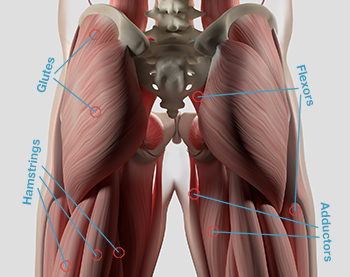 Hip flexors
Hip flexors
These muscles extend roughly from your spine to your thighs. Their main job is to pull your thighs toward your chest.
When they’re tight, they can pull the front of your pelvis downward, causing strain and pain in your lower back.
Hamstrings
This muscle group, including the biceps femoris muscle, runs along the backs of your thighs from your hips to your knees.
Your hams oppose your quadriceps, bending your knee and helping extend (straighten) your hip joints behind you.
Adductors
Located on the insides of your thighs, these muscles squeeze your legs together, and can cause tightness and limitation when you step laterally (sideways).
Glutes
The butt muscles work along with the hamstrings to extend, or straighten, your hips, and, with the aid of the abductors on the outsides of your hips, raise your legs out to the sides.
Stretch these four main areas to help increase mobility, and you’ll be good to go.
2 Main Types of Stretching and When to Use Them
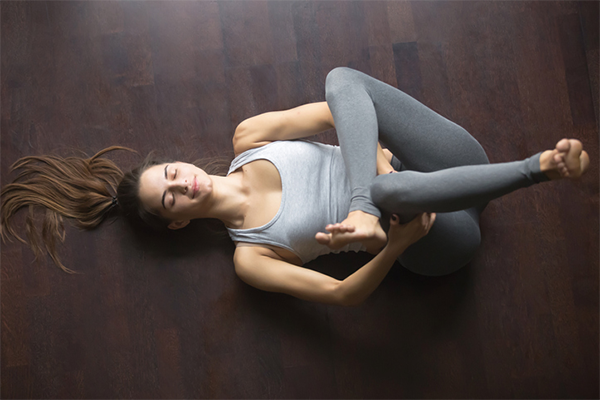
The 10 hip stretches below, all culled from the extensive library of full-body workout programs available on BODi, offer two different stretching techniques:
Dynamic stretching
These are large, full-range movements of one or more joints at once, often performed standing and sometimes while walking or jogging.
They resemble old-school movements you might have done in calisthenics or gym class: arm swings, leg swings, high-knee walks.
You usually count off reps, rather than time, on dynamic stretches, which work best as a warm-up activity before a workout, or any time you need a pick-me-up boost throughout the day.
Static stretching
These movements are slower and mellower; they’re the reach-and-hold stretches you might see in a basic yoga or stretching class.
Forward bends, knees-wide butterfly stretches, the pigeon, or the figure 4 pose in yoga are classic examples.
Often you’ll perform static stretches seated or lying down, and focus on breathing slowly and deeply to facilitate relaxation — sometimes for several minutes at a time.
Static stretches can be very effective at loosening you up, but they also inhibit performance in the stretched muscles for a short time afterward.
So they’re best reserved for after a workout, or as an anytime stress reliever — just not right before a workout involving the muscles you’re stretching.
